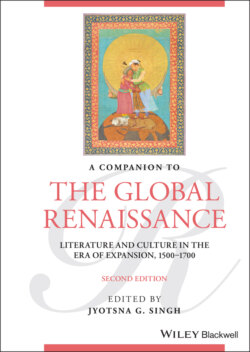Читать книгу A Companion to the Global Renaissance - Группа авторов - Страница 36
NOTES
Оглавление1 1 Margreta de Grazia sees the “framing” of the proscenium stage as a seeming “materialization of this modern concept of visibility and knowability” (de Grazia, 19). Yet Heidegger would place knowability ahead of the visible; he is radically opposed to materialization (albeit to his and our cost) and thus evokes the visible but renders it remote. Early modern dramatists like Marlowe did not write for the proscenium stage, whose framing, in any case, is radically different from Heidegger’s coinage Gestell, which is a setting-in-place or a system, and nothing like a picture frame or proscenium arch (Heidegger, 127, 141).
2 2 For knowledge of Arabic and thus Islam on the part of two instructors in Hebrew at Cambridge, see Miller (264–266). He does not touch on aniconism.
3 3 Burton (58–62). When Burton cites the “superstitious bells” passage later in his reading of Part I as evidence of Tamburlaine’s pro-Christian stance, he does not connect it to his discussion of bell-metals (77).
4 4 Hanmer (B3 verso, C6 verso); and see Lonicerus (117–118).
5 5 The New York Public Library possesses a copy. Bedwell cites this translation in his epistle to the reader and uses it in his glossary entry on “Azzekom,” his version of the word, citing Robertus’s “Ezetius,” “Ezecus,” and finally “Ezzecum”: Mohammedis imposturae (L4 verso).
6 6 My thanks to Ms. Gill Cannell of the Parker Library, Corpus Christi College, Cambridge, for this information.
7 7 Lonicerus (Volume I, Book 2, Second Part, 122). I’ve had access only to the 1584 edition of this text in the New York Public Library, with its different pagination from the 1578 edition Seaton consulted.
8 8 Lonicerus (121). On “Curaam,” see Samuel Purchas, Purchas his Pilgrimage, or Relations of the World and the Religions observed in all ages and places discovered (332). See also George Abbot, An exposition upon the prophet Ionah (8). There is no entry as yet in the OED. Compare Tamburlaine himself on “the Turkish Alcaron” as “the abstracts of thy foolish laws”: Tamburlaine II, 5.1.172, 196.
